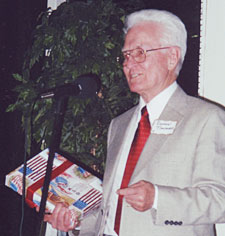Posted: 9/07/07
CYBER COLUMN:
Life is short
By Brett Younger
When our oldest son was born, friends came to the hospital, asked to hold the baby, and commented on how glad they were that he looked like his mother. As they were leaving, several said something like, “Don’t blink, because that’s how long it will be before he’s off to college.”
At the time, I thought it was a stupid comment. I knew any child of Carol’s was going to be smart, but he wasn’t ready for college.
But they were right. Two weeks ago, we took our son to college. I find this hard to believe. It feels like he started crawling a month ago, went to kindergarten a week ago, and got his driver’s license a few days ago. It seems like only yesterday he was lying on the couch throwing food and making silly noises, when actually it was a month ago.
The great American poet Dr. Seuss wrote,
How did it get so late so soon,
It’s night before it’s afternoon.
December is here before it’s June.
My goodness how the time has flewn.
How did it get so late so soon?
It gets so late so soon. We know that life is short, and yet we spend our lives as if we have nine of them to spend. We give too many of our days to not nearly enough. We act as if life is always about to begin. The real part of our life is on the way, but first we have to get past a couple of things, some unfinished business, time still to be served, a debt to be paid, a responsibility to take care of. Then life will begin. We recognize how wrong it is to throw a life away, and yet don’t see how sinful it is to do the same thing an hour at a time. Life is wasted hour by hour, day by day, in a thousand small, uncaring ways.
As the renowned philosopher Ferris Bueller said: “Life goes by pretty fast. If you don’t stop and look around once in awhile, you could miss it.”
Life is too short for fantasy baseball, computer solitaire or Deal or No Deal.
Life is too short for microwave pizza, bad novels or having the cleanest gutters on the block.
Life is too short to keep waiting for vacation, a special occasion or a better day.
Life is too short to sit around moping, choosing despair or worrying what people think.
Life is too short to complain about those you don’t like, look for revenge or spend your precious time trying to convince a person who wants to live in gloom and doom otherwise.
Life is too short to be bitter over things you can’t change, want to go back to what was or always do the same thing.
Life is too short to be bored, always blend in or sit in the corner while the band is playing.
Life is too short to intend to live a new life but never get around to it.
We shouldn’t give ourselves to things that are less than God’s best or surrender ourselves to the values of the world, because life is short.
Life is short, so live every day as if it were your last, because some day you’ll be right.
Life is short, so do what you love to do, and give it your very best. Whether it’s business or teaching or medicine, if you don’t love what you’re doing and can’t give it your best, look seriously at getting out of it.
Life is short, so recognize that today is the only day you have, eat dessert first and read good books.
Life is short, so go to church, stay awake and sing.
Life is short, so tell the truth, take care of this day and dance.
Life is short, so listen to the people you love, tell them how much they mean to you and visit someone else’s mother in the nursing home.
Life is short, so recognize that every day is a special occasion, do something interesting, have some fun, look for excuses to laugh and choose to be happy.
Life is short, so forgive. Look past the faults of others, just like you hope they will do for you.
Life is short, so surround yourself with gracious people, hug your friends and care for someone you haven’t cared for before.
Life is short, so be courageous, take a chance, live so that when your life flashes before your eyes, you’ll have plenty to watch.
Life is short, so embrace the possibilities, try something new, see that every day is an opportunity and dream, but don’t just dream, follow those dreams.
Life is short, so breathe and think deeply, don’t give your heart to that which won’t fill your heart and make the changes that will make the difference.
Life is short, so celebrate God’s grace, make time for the things that matter, and don’t leave yourself regretting things you didn’t do.
Pray hard, believe in Christ with all of your heart, soul, mind and strength. Celebrate the love of God, because it’s later than you think. And life is short.
Brett Younger is pastor of Broadway Baptist Church in Fort Worth and the author of Who Moved My Pulpit? A Hilarious Look at Ministerial Life, available from Smyth & Helwys (800) 747-3016. You can e-mail him at byounger@broadwaybc.org.
News of religion, faith, missions, Bible study and Christian ministry among Texas Baptist churches, in the BGCT, the Southern Baptist Convention ( SBC ) and around the world.





